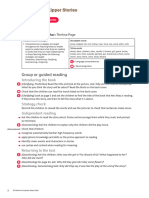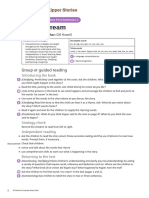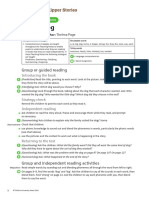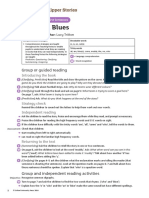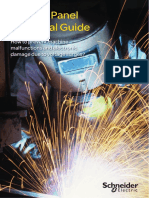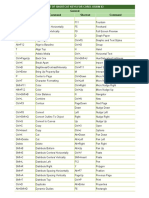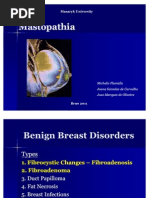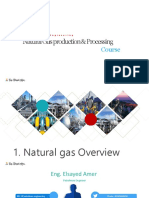The Flying Carpet: Group or Guided Reading
The Flying Carpet: Group or Guided Reading
Uploaded by
MisbahSakraniCopyright:
Available Formats
The Flying Carpet: Group or Guided Reading
The Flying Carpet: Group or Guided Reading
Uploaded by
MisbahSakraniOriginal Title
Copyright
Available Formats
Share this document
Did you find this document useful?
Is this content inappropriate?
Copyright:
Available Formats
The Flying Carpet: Group or Guided Reading
The Flying Carpet: Group or Guided Reading
Uploaded by
MisbahSakraniCopyright:
Available Formats
Oxford Level 8 Stories
The Flying Carpet
Teaching Notes Author: Thelma Page
Comprehension strategies Tricky words
• Comprehension strategies are taught after, again, already, beautiful, because, before, believe, coming,
throughout the Teaching Notes to enable doesn’t, instead, kind, learning, people, school, someone, son,
pupils to understand what they are reading thought, through, want, wonder, worth, where, your
in books that they can read independently.
In these Teaching Notes the following = Language comprehension
strategies are taught:
Prediction, Questioning, Clarifying, = Word recognition
Summarising, Imagining
Group or guided reading
Introducing the book
• Read the title and talk about the picture on the cover. Look briefly through the pictures to see
what happens.
(Clarifying) Ask: Where do you think the story takes place? How can you tell? Do you know any other
stories about flying carpets? Do you know how a flying carpet works?
(Prediction) Read the blurb on the back cover. Ask: Do you think the boy in the picture is in this
country or another country? What makes you think that? What do you think will happen in this story?
Strategy check
Check that the children use a variety of strategies to make sense of the text.
Independent reading
• Ask the children to read the story. Remind them to use phonics and the sense of the sentence to
work out new words. Praise children for reading silently with concentration, and for reading aloud
with expression.
(Summarising) Ask children to tell you quickly what the story was about and what they liked about it.
Check that children:
• read independently and with increasing fluency longer and less familiar texts
• know how to tackle words that are not completely decodable (see chart above)
• read high and medium frequency words independently and automatically
• use syntax and context to build their store of vocabulary when reading for meaning.
Returning to the text
(Summarising) Ask the children to explain who was rescued and why. Ask: Why was the uncle wicked?
(Questioning) Look at pages 16–19. Ask: Why are these pictures in thought clouds? Who is telling
this part of the story? When did these events happen? Introduce the term ‘flashback’ to name the
technique for recounting past events in a story.
(Imagining) Ask: Where does this story take place? Can you find any words that describe the landscape?
(‘deserts’ and ‘mountains’ on page 10). Ask the children to close their eyes and imagine this setting.
Ask: What can you see? What can you hear?
1 © Oxford University Press 2014
Group and independent reading activities
Draw together ideas and information from across a whole text, using simple signposts in the text.
(Clarifying/Prediction) Ask the children to decide who they think is the ‘bad’ character in this story.
Find descriptions of the boy’s uncle on pages 15–18. Make a list of the words that describe his
character. Ask: What happens to this character at the end of the story? How can you tell that the boy
was a nicer character? Find evidence on page 16 and pages 24–26.
Can the children find evidence in the text to support their ideas of the characters?
Read independently and with increasing fluency longer and less familiar texts.
Ask the children to read a section of the story to you. Ask questions about this part of the story.
Ask them to explain how they worked out any unfamiliar words. Turn to page 27. Ask them to explain
the purpose of the ellipsis in the last sentence: ‘I wonder if…?’.
Did the children read independently with confidence and fluency? Could they explain the ellipsis?
Use syntax and context to build their store of vocabulary when reading for meaning.
(Clarifying) Read page 19 again. Ask the children to read the last sentence aloud. Ask: What is a
hostage? Use the context on this page to work out why it helps the uncle to keep the boy in prison.
On page 21, find the word ‘zoomed’. Ask: Is this a better word to use than ‘flew’ or ‘went’? Can you
explain why? On page 26, find the word ‘punished’. Ask: What does this word mean? Ask the children
to think of other words to use instead, e.g. ‘imprisoned’, ‘taught a lesson’, ‘locked up’.
Can the children work out the meaning of the word ‘hostage’? Could they suggest synonyms and say
why one word sounds better than another?
Spell with increasing accuracy and confidence, drawing on word recognition and knowledge of word
structure, and spelling patterns.
Ask the children to look at page 15 and find a word that ends with ‘-ly’. Ask: Can you think of another
word that ends with ‘-ly’ that means the same thing? (e.g. ‘unhappily’, ‘miserably’). Make a list of
‘-ly’ words. Notice whether the base word changes when ‘-ly’ is added: for example, words that do
not change include ‘sadly’, ‘quickly’, ‘kindly’, ‘suddenly’; words in which ‘y’ becomes ‘i’ are ‘happily’,
‘speedily’, ‘steadily’; words in which the final ‘e’ is dropped include ‘miserably’, ‘sensibly’, ‘horribly’.
Can children identify the ‘-ly’ suffix in words and think of other words with the same suffix?
Speaking, listening and drama activities
Present part of stories for members of their own class.
You will need card, felt pens, sellotape, lollypop sticks and pieces of fabric.
(Imagining) Discuss putting on a puppet show to tell the boy’s story from pages 16–19. Ask the
children to think of a title, e.g. ‘The Wicked Uncle Kidnaps the King’. Make a list of characters you
will need and make stick puppets for them. Ask children to choose characters, paint faces and attach
them to sticks, then drape fabric over the sticks for costumes.
• Ask the children to discuss what the characters will say and the types of voices they will use.
• Encourage them to act out the play with enthusiasm.
Have children interpreted their characters’ words using the correct tone of voice?
Writing activities
Explain their reactions to texts, commenting on important aspects.
• Ask the children, in pairs, to say what they liked about this story. Ask them to write a letter to their
partner telling them why this is a good story to read. They could cover the main points by completing
these sentences:
2 © Oxford University Press 2014
The story is about…
It is exciting when…
It is funny when…
The character I liked best was…because…
• Discuss ways of mentioning the ending without giving it all away. Write the suggestions on the
board, e.g. ‘The children finally outwit the wicked uncle.’ ‘After an exciting adventure the boy
becomes king again.‘
Can the children structure a letter, presenting their ideas about the story clearly and logically?
For teachers
Helping you with free eBooks, inspirational
resources, advice and support
For parents
Helping your child’s learning
with free eBooks, essential
tips and fun activities
www.oxfordowl.co.uk
3 © Oxford University Press 2014
You might also like
- Project Schedule - Construction of DamDocument1 pageProject Schedule - Construction of Damdupe2010100% (3)
- Gestures - Vilém FlusserDocument208 pagesGestures - Vilém FlusserrachelcocNo ratings yet
- PSST (T-2) RefresherDocument115 pagesPSST (T-2) Refresherjake100% (1)
- ort_bck_kidnappers_tnsDocument3 pagesort_bck_kidnappers_tnsiaz96145No ratings yet
- ort_bck_play_tnsDocument2 pagesort_bck_play_tnsahmadsubhanidogerNo ratings yet
- Miau222223Document3 pagesMiau222223Tiberiu PopaNo ratings yet
- Ort BCK Lostkey TnsDocument3 pagesOrt BCK Lostkey Tnsja7025No ratings yet
- Ort BCK Rainbowmach TnsDocument3 pagesOrt BCK Rainbowmach Tnsanil kumarNo ratings yet
- Ort BCK Brokenroof Tns PDFDocument3 pagesOrt BCK Brokenroof Tns PDFSobia KeswaniNo ratings yet
- Ort BCK Submarine TnsDocument3 pagesOrt BCK Submarine TnsMuhammad Mudassar JavedNo ratings yet
- Ort BCK Laughprincess TnsDocument3 pagesOrt BCK Laughprincess TnsunwantedadvertisementNo ratings yet
- Ort Bck Daylondon TnsDocument3 pagesOrt Bck Daylondon Tnsafshanaamir103No ratings yet
- ort_bck_storm_tnsDocument2 pagesort_bck_storm_tnsahmadsubhanidogerNo ratings yet
- Ort BCK Dinosaurs TnsDocument3 pagesOrt BCK Dinosaurs TnsAroobaNo ratings yet
- Ort BCK Stream TnsDocument2 pagesOrt BCK Stream TnsAlmira AslamNo ratings yet
- The Box of Treasure: Group or Guided ReadingDocument3 pagesThe Box of Treasure: Group or Guided ReadingEryNo ratings yet
- Ort BCK Icecream TnsDocument2 pagesOrt BCK Icecream TnsarjunhdgjNo ratings yet
- Ort BCK Castle TnsDocument2 pagesOrt BCK Castle Tnsgavin.macmillanNo ratings yet
- Fun at The BeachDocument2 pagesFun at The BeachThuy NguyenNo ratings yet
- Ort BCK Redplanet TnsDocument3 pagesOrt BCK Redplanet Tnshashimsaud880No ratings yet
- Ort BCK Newtrainers TnsDocument2 pagesOrt BCK Newtrainers Tnseyfs.2023No ratings yet
- Kipper's LacesDocument2 pagesKipper's LacesThuy NguyenNo ratings yet
- Ort BCK Victorian TnsDocument3 pagesOrt BCK Victorian TnsTalal GhouriNo ratings yet
- Ort BCK Atschool TnsDocument2 pagesOrt BCK Atschool TnsSophia AdamNo ratings yet
- ORT Nobody Wanted To PlayDocument3 pagesORT Nobody Wanted To PlayBatool FatimaNo ratings yet
- Ort BCK Hideseek TnsDocument3 pagesOrt BCK Hideseek TnsMai HamoudaNo ratings yet
- The Dragon DanceDocument2 pagesThe Dragon DanceDobre EsteraNo ratings yet
- Ort BCK Goawayfloppy TnsDocument3 pagesOrt BCK Goawayfloppy Tnskda.maryam.javaidNo ratings yet
- A New Dog ORTDocument2 pagesA New Dog ORTeyfs.2023No ratings yet
- Ort BCK Gran TnsDocument2 pagesOrt BCK Gran TnsRice BuoiNo ratings yet
- ort_bck_newhouse_tnsDocument2 pagesort_bck_newhouse_tnsahmadsubhanidogerNo ratings yet
- Decode Teaching Notes st5Document12 pagesDecode Teaching Notes st5Jiang TaoNo ratings yet
- The Egg Hunt: Group or Guided ReadingDocument3 pagesThe Egg Hunt: Group or Guided ReadingIrsa Shaheen100% (1)
- Reflect TNs - L18 - Holiday of A LifetimeDocument4 pagesReflect TNs - L18 - Holiday of A LifetimeThiha AungNo ratings yet
- The Lost TeddyDocument2 pagesThe Lost TeddyThuy NguyenNo ratings yet
- Learn English Through StoriesDocument4 pagesLearn English Through StoriesAngélique GILLOT100% (1)
- Ort BCK Secretroom TnsDocument2 pagesOrt BCK Secretroom TnsAbeeha FatimaNo ratings yet
- The HaircutDocument2 pagesThe HaircutThuy NguyenNo ratings yet
- The LibraryDocument2 pagesThe LibraryThuy NguyenNo ratings yet
- Ort Ttales Beautybeast TnsDocument4 pagesOrt Ttales Beautybeast Tnsyifan hanNo ratings yet
- Tutoring Strategies For Preschool and KindergartenDocument11 pagesTutoring Strategies For Preschool and KindergartenKarrie Mae GolilaoNo ratings yet
- LGA Tutorial Task EditedDocument14 pagesLGA Tutorial Task EditedRuba Tarshne :)No ratings yet
- Ttops Graphns Goldscarab TnsDocument5 pagesTtops Graphns Goldscarab TnsStanzin NamgailNo ratings yet
- How We See Teachers NotesDocument5 pagesHow We See Teachers NotesLinda WangNo ratings yet
- Kujawski Anna 11Document10 pagesKujawski Anna 11api-302257313No ratings yet
- Ort FP Fic Zip TnsDocument5 pagesOrt FP Fic Zip TnsMaha GaberNo ratings yet
- Ort Ttales Dancprincess TnsDocument4 pagesOrt Ttales Dancprincess Tnsyifan hanNo ratings yet
- ResourceDocument7 pagesResourceMarcelo Rios AielloNo ratings yet
- The BarbecueDocument2 pagesThe BarbecueThuy NguyenNo ratings yet
- Ttops Gs Sleeping Beauty TnsDocument4 pagesTtops Gs Sleeping Beauty TnsRADYA LaouijaNo ratings yet
- Spots!Document2 pagesSpots!Thuy NguyenNo ratings yet
- Ort BCK Redsblues TnsDocument2 pagesOrt BCK Redsblues TnsSophia AdamNo ratings yet
- Ort BCK Paris TnsDocument3 pagesOrt BCK Paris TnsAparna SHARMANo ratings yet
- Secret Seven Teachers NotesDocument6 pagesSecret Seven Teachers NotesNino MikadzeNo ratings yet
- Ttops Clas Tempest Tns PDFDocument6 pagesTtops Clas Tempest Tns PDFabdulmusaverbhNo ratings yet
- Raz Laa13 Under LpDocument5 pagesRaz Laa13 Under Lpmarchiue0905No ratings yet
- Telling A Story: This Is A Module I Wrote For Teachers at Upper Primary Stage in India. SourceDocument13 pagesTelling A Story: This Is A Module I Wrote For Teachers at Upper Primary Stage in India. SourceYogita Bhamare100% (1)
- Ttops Graphns Emperor TnsDocument5 pagesTtops Graphns Emperor Tnsbasha MohamoudNo ratings yet
- Pentecostal Tabernacle Read-Aloud Lesson PlanDocument12 pagesPentecostal Tabernacle Read-Aloud Lesson Plankevin roseNo ratings yet
- Ort Ttales Childrenlir TnsDocument4 pagesOrt Ttales Childrenlir Tnsyifan hanNo ratings yet
- ShoppingDocument3 pagesShoppingThuy NguyenNo ratings yet
- L11 - Baby Farm AnimalsDocument6 pagesL11 - Baby Farm AnimalsRAAM MECHNo ratings yet
- Consumer Behaviour Report - MarlboroDocument17 pagesConsumer Behaviour Report - Marlborosyedahsanalishah0% (1)
- Learning Episode 7,8,9Document16 pagesLearning Episode 7,8,9Julie SoquiñoNo ratings yet
- Final Essay - Visual CommunicationDocument8 pagesFinal Essay - Visual Communicationapi-635326425No ratings yet
- 2wvzq79gvycokolywolffkan 325-Sl Tower Crane NetworkDocument6 pages2wvzq79gvycokolywolffkan 325-Sl Tower Crane NetworkdjlivuNo ratings yet
- LCU Spring CatalogDocument19 pagesLCU Spring CatalogidlewildchurchNo ratings yet
- Manual Practic S9000 RO GealanDocument16 pagesManual Practic S9000 RO GealanAlexandru Pelin0% (1)
- CPTG002 - EN (Web) - SCHNEIDER PDFDocument16 pagesCPTG002 - EN (Web) - SCHNEIDER PDFmansa12No ratings yet
- List of Shortcut Keys For Corel Draw X4Document3 pagesList of Shortcut Keys For Corel Draw X4Harvinder Singh85% (13)
- HS Fitness Assessment and Plan Study GuideDocument22 pagesHS Fitness Assessment and Plan Study GuideLovely Grace CajegasNo ratings yet
- OLMS1Document6 pagesOLMS1Anjali ChaudharyNo ratings yet
- Dental Adhesives of The FutureDocument14 pagesDental Adhesives of The FutureShannon Victor PeterNo ratings yet
- Root Disk Mirroring On Debian LinuxDocument20 pagesRoot Disk Mirroring On Debian LinuxTedy TirtawidjajaNo ratings yet
- Applying The Pythagorean Theorem - Free Sample Lesson KEYDocument9 pagesApplying The Pythagorean Theorem - Free Sample Lesson KEYyoohera01No ratings yet
- BilingvDocument2 pagesBilingvSimona Elena Mosina100% (1)
- UnitechDocument176 pagesUnitechAsmita GuptaNo ratings yet
- Child Developmental MilestonesDocument21 pagesChild Developmental Milestonesjbusman100% (3)
- Ball Valve BrochureDocument32 pagesBall Valve BrochureHakan KuruoğluNo ratings yet
- A Primer On Opinion LettersDocument32 pagesA Primer On Opinion Lettersseti2016No ratings yet
- Topic:TENSES: Present Tense, Past Tense and Future TenseDocument8 pagesTopic:TENSES: Present Tense, Past Tense and Future TenseRoma ThakkarNo ratings yet
- The Genesis of Baloch Nationalism Politics and Ethnicity in Pakistan, 19471977 (Sheikh, Salman Rafi)Document269 pagesThe Genesis of Baloch Nationalism Politics and Ethnicity in Pakistan, 19471977 (Sheikh, Salman Rafi)shumaq shoaibNo ratings yet
- Moore 1966Document234 pagesMoore 1966splut99100% (1)
- MastopathiaDocument21 pagesMastopathiaMichalis PloumidisNo ratings yet
- Natural Gas Overview From AONG Website PDFDocument22 pagesNatural Gas Overview From AONG Website PDFMohamed OuichaouiNo ratings yet
- AA Example Layer Naming and CodingDocument5 pagesAA Example Layer Naming and CodingYasmineNo ratings yet
- DFSDSDDocument1 pageDFSDSDANKESH SHRIVASTAVANo ratings yet
- 3rd English ExamDocument6 pages3rd English ExamVergil AlonNo ratings yet
- Kinematics Video Analysis WorksheetDocument21 pagesKinematics Video Analysis WorksheetSoonGiaprongNo ratings yet




